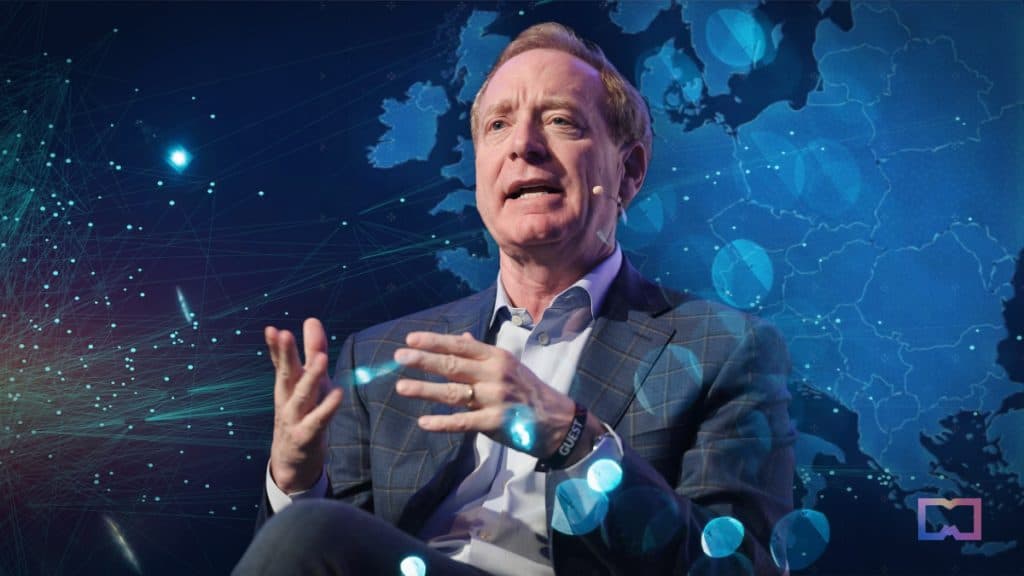In the article by Metaverse Post, Microsoft President Brad Smith discusses the dynamics of AI governance across Europe.
In Brief
During his visit to Brussels for the Microsoft hosted event on 'Europe's Digital Transformation,' Smith is set to discuss AI governance on both European and global stages.
Smith emphasizes that while AI has the potential to drive economic growth in Europe, it also introduces various challenges that must be addressed, such as ethical concerns and societal impacts.
He has outlined a strategic approach consisting of five key points aimed at governing AI, which emphasizes collaborations between the public and private sectors.

Delivering his address at the 'Embracing the AI Opportunity' summit on June 29 in Brussels, Microsoft President Brad Smith focuses on the importance of AI governance.
The EDT2023 event, organized by Microsoft, delves into how Europe can leverage AI to advance its digital transformation across various sectors like healthcare, education, automotive, and manufacturing.
Smith stated that AI's role in accelerating Europe's economic growth is crucial while also acknowledging the imperative to manage its associated challenges.
Smith wrote on Twitter.
In a blog post Earlier today, Smith shared a five-point framework for AI governance, identifying critical issues and advocating for partnerships between government and industry to tackle these matters. five-point blueprint Last month, a document was released spotlighting current and future challenges of AI, and it aims to stipulate guidelines through relevant public policies, laws, and regulations. Key highlights include:
- Establish and enhance new safety regulations for AI, driven by government initiatives.
- Mandate safety mechanisms for AI systems managing essential infrastructure , akin to safety protocols in other technological domains.
- Create a comprehensive legal structure that reflects the technological layers of AI, outlining regulatory roles at different stages: applications, models, and infrastructure.
- Encourage openness in AI technologies and increase access to AI-related tools for researchers and nonprofits.
- Foster new collaborations between public resources and private innovations to effectively address the societal challenges brought about by AI.
In May, Brad Smith expressed concerns Speaking about the implications of deepfake technology, he stressed the importance of differentiating authentic content from AI-generated fake materials. In his remarks, he also stressed caution regarding external cyber-influence threats. Smith argued for the licensing of fundamental AI technologies to ensure security measures are in place for both physical and cybersecurity as well as national interests. AI regulation Efforts in AI Regulation in Europe
Smith points out the necessity for organizations to establish their own governance frameworks for AI. Microsoft, for instance, has put ethical guidelines into practice, refining them through ongoing training and testing. A program intended for assessing AI applications has been initiated, ensuring customized guidance for specific use cases.
Microsoft promotes ethical AI practices through its corporate ethos, which includes the recruitment of diverse talent and embracing a multidisciplinary approach. Smith underlines the collective endeavor to craft a responsible AI future, highlighting the need for ongoing evolution as technology progresses.
as a framework for guiding AI's development, potentially influencing global benchmarks. This legislation entails stipulations for foundational AI models, requiring providers to conduct safety assessments and data management strategies before launching their offerings.
The EU is developing an AI Act Microsoft President Brad Smith articulates crucial objectives for laying the groundwork for accountable AI.
Read more :
- Microsoft is downsizing its entire Ethical AI department to redirect focus towards OpenAI initiatives.
- The EU is pressing tech companies to tag content generated by AI to combat misinformation effectively.
- , please be aware that the content on this page shouldn't be seen as legal, financial, investment or any professional advice. It's crucial to invest only what you can afford to lose and to seek independent financial guidance if uncertain. For detailed information, we recommend checking with the issuer's terms and conditions as well as their help resources. MetaversePost strives for precise and impartial reporting, but market conditions may change unexpectedly.
Disclaimer
In line with the Trust Project guidelines Agne, a journalist at Metaverse Post, reports on the rapidly evolving fields of the metaverse, AI, and Web3. With a passion for storytelling, she has interviewed numerous industry experts, always on the lookout for fascinating narratives. Agne holds a Bachelor's in literature and has a rich writing history covering diverse topics such as travel, culture, and art. She has also volunteered with an organization focused on animal rights, raising awareness about animal welfare. Connect with her at







